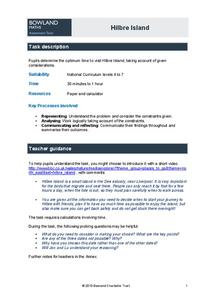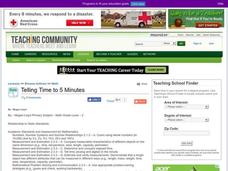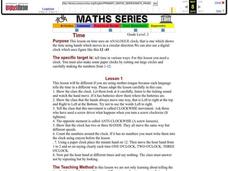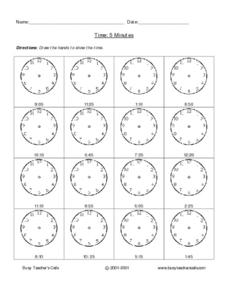Bowland
Hilbre Island
Young travelers plan a trip to Hilbre Island based on constraints on tides and time. They use a timeline to help determine the optimal day/time to make the trip.
Curated OER
Bar Graphs With Intervals
Give your math class a comprehensive understanding of bar graphs with this series of lessons. The resource is divided into three parts, and all of the accompanying worksheets are included. The class will study different bar graphs,...
Common Core Sheets
Matching Clocks (5 Minute Increments)
Second graders match the time on an analog clock to the time on a digital clock. Each sheet has 16 problems for solving.
Curated OER
Measuring Speed in the Universe
In this measuring speed in the universe activity, students use photographs of 3 astronomical phenomena including supernova explosions, coronal mass ejections and solar flare shock waves to find how fast they move. The photographs show...
Curated OER
Telling Time Worksheet: Drawing Hands on a Clock
Can your learners tell time? Give them practice with this resource. For each of nine clocks, youngsters must use the numerical time to draw the hands on the clock.
Curated OER
What Time is it? (A)
First and second graders learn how to tell time using illustrations of an analog clock. Eight clocks are shown, each representing a different five-minute interval. Answers are provided on the second sheet.
Curated OER
Telling Time to 5 Minutes
In this second grade lesson your class will practice telling time. The goal is to tell time to five minutes using an analog clock. Your young students count by 5 minute intervals and discuss elapsed time.
Curated OER
Hickory Dickory Doc Tell Time
Students discover time keeping by reading clocks. In this time-telling instructional activity, students read the story Hickory Dickory Dock, and discuss the measurements of time we use. Students complete worksheets in which...
101 Questions
Travel Times
It's just a sign of the times. Given a billboard with distances and travel times to two different interstate highway junctions, learners determine the speed limit. They must incorporate the concepts of distance, rate, and time with that...
Curated OER
Time
Here, learners review telling time using an analog clock. They use a clock to tell time, make a paper clock, and discuss the concept of elapsed time. However, the lesson is not always easy to follow, nor are the questions clear.
Curated OER
Keep Track of time by watching the clock
Learners answer questions about the clock. In this time lesson, students answer questions using intervals of five minutes. Learners solve problems about how long to the next activity, how much longer, and whether or not we have...
Curated OER
Time 5 Minutes
If your learners have already been introduced to telling time in five-minute intervals, this resource will provide extra practice! Or consider using it as a formal assessment. Have your learners developed time-telling skills?
Curated OER
How To Measure Time
Students practice telling time on an analog clock. In this time measurement lesson, students use individual analog clocks to identify the hour and minute hand. Students identify how to tell time by moving the hour and minute hand.
Curated OER
Mathematics: A Picture's Worth a Thousand Words
Students examine school yearbooks from 1950 to the present. They count the number of male and female teachers and administrators. They compile date and extrapolate changes in job trends.
Balanced Assessment
Dinner Date
Determine just how far to run before dinner. The short assessment asks pupils to determine the distance a person can jog in the time left before dinner. To answer the question, scholars determine the distance if the person jogs one...
Curated OER
Analog Clock Faces: Drawing Hands on Analog Clocks Telling Digital Time in 5 Minute Intervals
In this telling time worksheet, students study 9 blank clocks with a digital time written below. Students draw the hands on the clocks to match the times that are to the nearest 5 minutes.
Statistics Education Web
Did I Trap the Median?
One of the key questions in statistics is whether the results are good enough. Use an activity to help pupils understand the importance of sample size and the effect it has on variability. Groups collect their own sample data and compare...
EngageNY
Interpreting Quadratic Functions from Graphs and Tables
Seeing functions in nature is a beautiful part of mathematics by analyzing the motion of a dolphin over time. Then take a look at the value of a stock and maximize the profit of a new toy. Explore the application of quadratics by...
Balanced Assessment
Multi-Graphs
So many things change as time goes by. Here, scholars create graphs based on this premise. Each problem asks pupils to sketch a graph that describes a given situation. Their graphs represent various characteristics such as height,...
CK-12 Foundation
Order Real Numbers: Pie Baking Contest
Time is on your side. Scholars plot three points on number lines with different time units to represent the time it takes three people to bake pies. They determine the fastest baker and the difference in times between the bakers.
Curated OER
Instantaneous Rate of Change of a Function
Pupils draw the graph of a door opening and closing over time. They graph a given function on their calculators, create a table of values and interpret the results by telling if the door is opening or closing and evaluate the average...
Curated OER
Swing in Time
Young scholars examine the motion of pendulums and come to understand that the longer the string of the pendulum, the fewer the number of swings in a given time interval. They see that changing the weight on the pendulum does not have an...
Curated OER
Worksheet 29 - Interval
In this interval worksheet, students find integrals of functions, use the first derivative test to classify points, and find the local and global extrema. This one-page worksheet contains eight multi-step problems.
Curated OER
Worksheet 30 - Intervals
In this interval worksheet, students divide functions into intervals. They computer the upper and lower sums for the partition. This two-page worksheet contains approximately eight multi-step problems.























